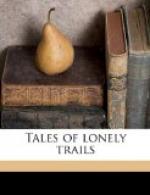I had been tired for a long time and now I began to limp and lag. I wondered what on earth would make Wetherill and the Indians tired. It was with great pleasure that I observed the giant Joe Lee plodding slowly along. And when I glanced behind at my straggling party it was with both admiration for their gameness and glee for their disheveled and weary appearance. Finally I got so that all I could do was to drag myself onward with eyes down on the rough ground. In this way I kept on until I heard Wetherill call me. He had stopped—was waiting for me. The dark and silent Indian stood beside him, looking down the canyon.
I saw past the vast jutting wall that had obstructed my view. A mile beyond, all was bright with the colors of sunset, and spanning the canyon in the graceful shape and beautiful hues of the rainbow was a magnificent natural bridge.
“Nonnezoshe,” said Wetherill, simply.
This rainbow bridge was the one great natural phenomenon, the one grand spectacle which I had ever seen that did not at first give vague disappointment, a confounding of reality, a disenchantment of contrast with what the mind had conceived.
But this thing was glorious. It absolutely silenced me. My body and brain, weary and dull from the toil of travel, received a singular and revivifying freshness. I had a strange, mystic perception that this rosy-hued, tremendous arch of stone was a goal I had failed to reach in some former life, but had now found. Here was a rainbow magnified even beyond dreams, a thing not transparent and ethereal, but solidified, a work of ages, sweeping up majestically from the red walls, its iris-hued arch against the blue sky.
[Illustration: First sight of the great natural bridge]
[Illustration: Nonnezoshe]
Then we plodded on again. Wetherill worked around to circle the huge amphitheater. The way was a steep slant, rough and loose and dragging. The rocks were as hard and jagged as lava, and cactus hindered progress. Soon the rosy and golden lights had faded. All the walls turned pale and steely and the bridge loomed dark.
We were to camp all night under the bridge. Just before we reached it Nas ta Bega halted with one of his singular motions. He was saying his prayer to this great stone god. Then he began to climb straight up the steep slope. Wetherill told me the Indian would not pass under the arch.
When we got to the bridge and unsaddled and unpacked the lame mustangs twilight had fallen. The horses were turned loose to fare for what scant grass grew on bench and slope. Firewood was even harder to find than grass. When our simple meal had been eaten there was gloom gathering in the canyon and stars had begun to blink in the pale strip of blue above the lofty walls. The place was oppressive and we were mostly silent.
Presently I moved away into the strange dark shadow cast by the bridge. It was a weird black belt, where I imagined I was invisible, but out of which I could see. There was a slab of rock upon which I composed myself, to watch, to feel.




